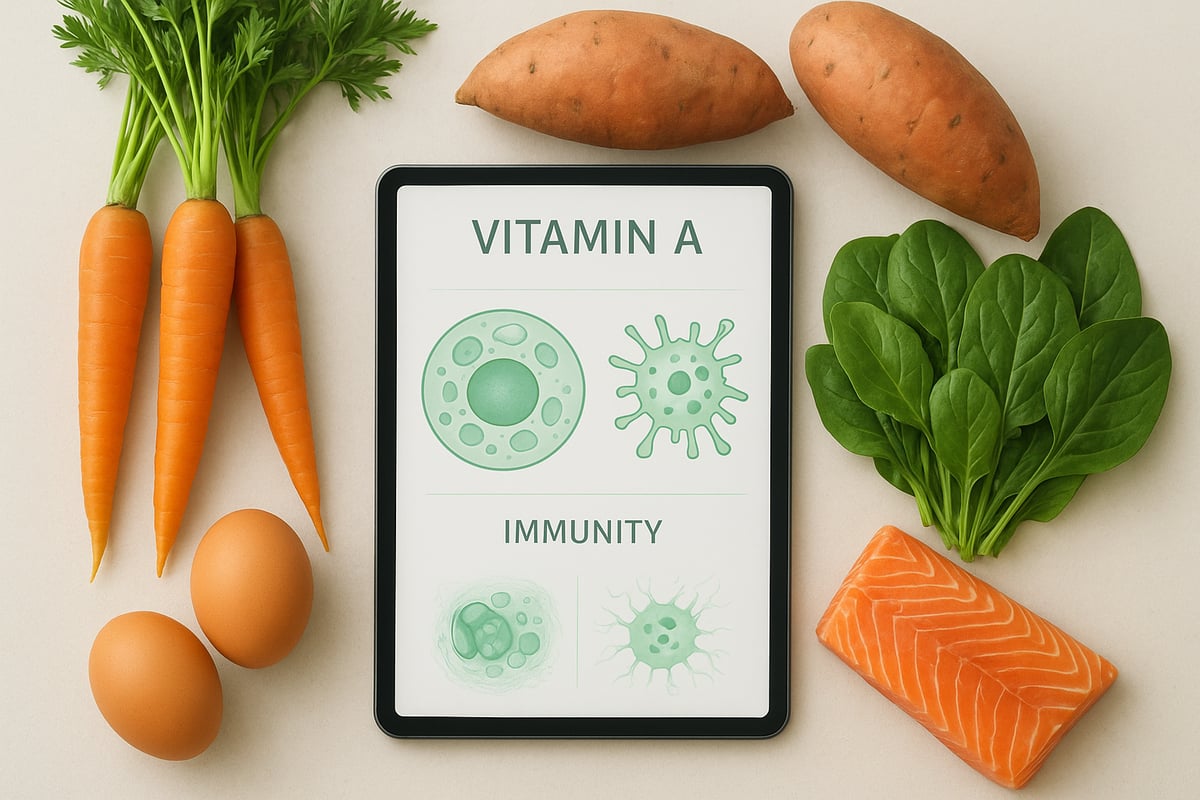
7 Surprising Vitamin A Benefits You Should Know in 2025
Share
Imagine if a single nutrient could quietly shape your health in ways science is only now beginning to reveal. In 2025, Vitamin A is doing just that, with new studies highlighting its transformative impact far beyond what most expect.
This article uncovers seven surprising, science-backed vitamin a benefits you should know for optimal wellness this year. The story goes well beyond better eyesight.
Discover how Vitamin A supports immune resilience, glowing skin, and more. Ready to leverage the latest research for your own health? Let’s explore the real power of Vitamin A.
What Is Vitamin A? Understanding the Basics
Vitamin A is a fat-soluble vitamin that plays a fundamental role in human health, yet its importance is often underestimated. As research continues to reveal new vitamin a benefits, understanding its function has never been more crucial, especially in 2025. This nutrient is essential for growth, immunity, vision, and the maintenance of healthy skin and tissues.
Vitamin A comes in two primary forms. Preformed Vitamin A, or retinol, is found in animal-based foods such as beef liver, eggs, dairy products, and salmon. Provitamin A carotenoids, like beta-carotene, are present in plant-based foods including carrots, sweet potatoes, spinach, kale, and cantaloupe. The body efficiently converts these carotenoids into active Vitamin A, though the rate can vary depending on individual factors like genetics and overall diet. This conversion process is central to unlocking the full spectrum of vitamin a benefits, especially for those who follow plant-based diets.
To meet daily vitamin a benefits, the Recommended Dietary Allowance (RDA) is 900 micrograms (mcg) for men and 700 mcg for women, with higher needs during pregnancy and breastfeeding. Bioavailability differs between sources, as whole foods generally offer better absorption than supplements. The table below summarizes top sources:
| Animal Sources | Plant Sources |
|---|---|
| Beef liver | Carrots |
| Eggs | Sweet potatoes |
| Dairy (milk, cheese) | Spinach, kale |
| Salmon | Cantaloupe |
Despite easy access in some regions, Vitamin A deficiency remains a global concern, affecting over 190 million children worldwide, particularly in developing countries and among vulnerable groups. For the latest research on the impact of vitamin a benefits across health domains, Vitamin A and Human Health: Latest Research provides valuable insights. As we move into 2025, recognizing the sources, recommended intakes, and the science behind Vitamin A is key to optimizing wellness.

The Science Behind Vitamin A’s Health Benefits
Vitamin A is far more than just a vision vitamin. Recent research underscores that vitamin a benefits extend into nearly every system in the body. From supporting cellular growth to driving immune defenses, the science behind this nutrient is both robust and rapidly evolving.

Essential Roles in the Body
Vitamin A plays a foundational role in human biology. It is vital for the growth and differentiation of cells, guiding how tissues form and function. Without adequate vitamin A, the body struggles to maintain healthy development and repair.
One of the most recognized vitamin a benefits is its critical function in vision. Vitamin A is a core component of rhodopsin, a pigment in the retina that enables low-light and night vision. Inadequate intake can lead to night blindness and impaired sight.
The immune system also relies heavily on vitamin A. It supports mucosal barriers in the gut and respiratory tract, helping block pathogens. Further, vitamin A enhances the activity of white blood cells, bolstering the body's defense against infections.
Reproductive health is another area where vitamin a benefits are evident. Sufficient levels are necessary for fertility in both men and women, as well as healthy fetal development.
Skin and tissue repair depend on vitamin A to regulate cell turnover, promote wound healing, and maintain barrier integrity. Studies have shown that individuals with sufficient vitamin A have lower infection rates and improved recovery from illness.
Emerging research highlights that vitamin A does not act alone. It interacts with other micronutrients such as vitamins D, E, C, and zinc, amplifying its positive effects. For a deeper dive into these complex relationships, see this Vitamin A and Micronutrient Interactions.
Risks of Deficiency and Excess
While vitamin a benefits are substantial, both deficiency and excess can have serious health implications. Deficiency symptoms include night blindness, dry or scaly skin, and increased susceptibility to infections. Children, pregnant women, vegans, and individuals with malnutrition are especially at risk.
The table below summarizes key risks:
| Symptom/Condition | Deficiency Risk | Excess Risk |
|---|---|---|
| Night Blindness | High | None |
| Dry Skin | High | Peeling, Irritation |
| Infection Susceptibility | High | None |
| Birth Defects | Moderate | High (Toxicity) |
| Liver Damage | None | High |
Toxicity, or hypervitaminosis A, can result from consuming excessive supplements. Symptoms include headache, nausea, joint pain, and, in severe cases, liver damage or birth defects. Current guidelines set the safe upper limit for adults at 3,000 mcg of preformed vitamin A daily.
Globally, vitamin A deficiency remains a major issue, affecting over 190 million children and leading to preventable blindness and increased mortality. High-dose supplements can be dangerous, especially for pregnant women, due to the risk of birth defects. Thus, balance and source are crucial when considering vitamin a benefits.
Modern Research and 2025 Insights
New studies in 2025 are redefining our understanding of vitamin a benefits. Recent clinical trials suggest vitamin A may play a protective role against chronic diseases such as certain cancers and cardiovascular conditions. Innovations in plant-based, bioavailable forms are making it easier for people with dietary restrictions to meet their needs.
Personalized nutrition is also gaining ground. Scientists have found that genetic differences affect how individuals metabolize vitamin A, leading to tailored recommendations for optimal health. For example, 2025 research reveals that vitamin A can modulate immune responses, potentially aiding in recovery from viral infections such as COVID-19.
Clinical data show that adequate vitamin A intake correlates with reduced infection rates and improved outcomes in vulnerable populations. As the science evolves, it is clear that understanding and leveraging these vitamin a benefits is essential for modern wellness strategies.
7 Surprising Vitamin A Benefits You Should Know in 2025
Vitamin A is gaining renewed attention for its wide-ranging effects on health in 2025. While most people associate it with vision, the latest research reveals a suite of vitamin a benefits that extend far beyond eye health. Discover how this essential nutrient is quietly reshaping wellness, from immune resilience to gut balance.

1. Supports Immune System Resilience
Vitamin A is a cornerstone for a robust immune system, especially in 2025 as we continue to prioritize health defenses. It fortifies mucosal barriers in the gut and respiratory tract, creating the first line of defense against pathogens. Research highlights how vitamin a benefits include increased production and efficiency of white blood cells, helping the body swiftly neutralize infections.
Clinical studies have consistently shown lower infection rates where vitamin A intake is adequate. Children receiving supplementation experienced up to a 24% reduction in severe infections, underscoring the value of this nutrient in public health. The latest findings even suggest vitamin A may enhance viral immunity and support recovery from illnesses such as COVID-19.
Plant-based vitamin A sources also offer antioxidant support, amplifying these immune effects. For those interested in a holistic approach, see how vitamin A fits into the top supplements for immune health. With new insights emerging in 2025, vitamin A benefits are more relevant than ever for immune resilience.
2. Promotes Healthy, Glowing Skin
Among the most sought-after vitamin a benefits is its remarkable impact on skin vitality. Vitamin A regulates the turnover of skin cells, reducing dryness, flakiness, and the visible signs of aging. It also helps normalize oil production, making it an ally in the fight against acne.
Clinical trials have shown that both topical and oral forms of vitamin A can help manage skin conditions like eczema and psoriasis. In fact, deficiency is linked to a 30% higher risk of developing various skin disorders. The nutrient also supports wound healing, minimizing scarring and promoting faster recovery.
In 2025, there is a surge in the use of plant-based retinoids, especially for those with sensitive skin. These new formulations work synergistically with other nutrients such as zinc and vitamin E, further enhancing skin health. For anyone seeking radiant skin, vitamin a benefits offer compelling reasons to review your nutrition.
3. Protects and Enhances Vision Beyond Night Blindness
Vitamin A’s reputation for vision health is well-deserved, but its benefits reach further than most realize. It maintains a clear cornea and keeps eyes properly hydrated, which is essential for overall comfort and function. Vitamin a benefits also include preventing night blindness and slowing the progression of age-related macular degeneration (AMD).
The landmark Age-Related Eye Disease Study (AREDS) found a 25% lower risk of advanced AMD when antioxidants including vitamin A were consumed regularly. Given that AMD is now the leading cause of blindness in developed countries, this is a critical finding.
Emerging research in 2025 highlights vitamin A’s role in protecting eyes from blue light exposure, a growing concern in our digital age. Plant carotenoids, a form of vitamin A, may provide even broader eye health support, making them a valuable part of a modern wellness strategy.
4. May Lower Risk of Certain Cancers
Among the lesser-known vitamin a benefits is its role in regulating cell growth and differentiation, which helps prevent abnormal cell proliferation—a key factor in cancer development. Observational studies link higher intake, especially from plant sources, to a lower risk of cancers such as Hodgkin’s lymphoma, cervical, lung, and bladder cancer.
A recent meta-analysis revealed a 17% reduction in lung cancer risk among non-smokers with high plant-based vitamin A intake. In 2025, research is focusing on vitamin A’s influence on DNA repair and epigenetic regulation, opening new avenues in preventive medicine.
It is important to note that whole foods, rather than supplements, provide the most consistent protective effects. This reinforces the message that dietary choices greatly influence long-term wellness and cancer risk reduction.
5. Supports Reproductive Health and Fertility
Vitamin A is vital for reproductive health in both men and women. It plays a central role in sperm production, ovulation, and the healthy development of the placenta and fetus. Without sufficient vitamin A, the risk of infertility and birth defects rises significantly.
Studies show that maintaining adequate vitamin A status improves fertility outcomes. In fact, 10–15% of infertility cases are linked to micronutrient deficiencies, with vitamin A being a key contributor. Recent trends in 2025 highlight the importance of preconception nutrition, including plant-based prenatal supplements.
However, balance remains crucial, as excessive intake of vitamin A can be harmful during pregnancy. With guidance from healthcare providers, individuals can leverage these vitamin a benefits to support reproductive wellness safely.
6. Strengthens Bones and Dental Health
Another group of vitamin a benefits centers on bone and dental health. Vitamin A is involved in bone growth and remodeling by influencing osteoblast and osteoclast activity. It also works together with vitamin D and K2 to ensure proper calcium metabolism, which is fundamental for strong bones.
Research links adequate vitamin A intake to a lower risk of osteoporosis and fractures. Populations with low vitamin A intake face up to a 20% higher fracture risk. In addition, vitamin A supports the formation of healthy tooth enamel and contributes to gum health.
New data in 2025 suggest vitamin A may also play a role in balancing the oral microbiome, further protecting teeth and gums. This underscores the importance of food synergy and a balanced diet for skeletal and dental resilience.
7. Boosts Gut Health and Microbiome Balance
Vitamin a benefits extend to the digestive system, where it helps maintain the integrity of the gut lining and supports beneficial gut bacteria. This reduces inflammation and lowers the risk of leaky gut syndrome, a condition linked to various health concerns.
Animal studies have shown that vitamin A supplementation improves microbiome diversity. In children, adequate intake is associated with a 30% reduction in gut infections, highlighting its importance for both prevention and recovery.
Ongoing research in 2025 explores the synergy between vitamin A and probiotics, suggesting that whole-food sources provide not only the nutrient but also additional prebiotics and antioxidants. Maintaining gut health with vitamin a benefits is now recognized as a pillar of overall wellness.
How to Get Enough Vitamin A: Foods, Supplements, and Safety Tips
Getting enough vitamin a benefits starts with understanding where to find this essential nutrient in your diet. Both animal and plant sources can help you meet your daily needs, but knowing how to maximize absorption is just as crucial.

Top Food Sources of Vitamin A
To unlock vitamin a benefits, include a mix of these foods in your meals:
| Animal Sources | Plant Sources |
|---|---|
| Beef liver | Carrots |
| Salmon | Sweet potatoes |
| Eggs | Spinach |
| Dairy (milk, cheese) | Kale, Cantaloupe |
Animal sources provide preformed Vitamin A (retinol), which is readily absorbed. Plant foods offer provitamin A carotenoids, converted by your body into active Vitamin A. Pairing plant foods with a healthy fat, such as olive oil or avocado, improves absorption.
Cooking Tips
- Lightly cook or steam vegetables like carrots and spinach to enhance bioavailability.
- Add a small amount of oil or nuts to salads with kale or sweet potatoes.
- Avoid overcooking, as excessive heat can lower vitamin content.
Supplementation and Safety
Most people can achieve optimal vitamin a benefits through a balanced diet. However, some groups—such as vegans, pregnant women, or individuals with malabsorption issues—may need supplements. When considering a supplement, choose a reputable brand and avoid mega-doses to prevent toxicity.
If you are seeking a balanced approach to supplementation, consider options that provide Vitamin A alongside other essential nutrients. For more guidance, visit Essential Life Multivitamins for Wellness.
Safety Tips
- Do not exceed the upper intake level (3,000 mcg RAE for adults).
- Signs of toxicity include headache, dizziness, and joint pain.
- Pregnant women should avoid high-dose supplements, as excess intake may harm fetal development.
Special Populations and 2025 Trends
Vegans should focus on colorful fruits and vegetables for vitamin a benefits, while pregnant or breastfeeding women might require higher intakes under medical supervision. In 2025, plant-based and bioavailable Vitamin A supplements are on the rise, offering new options for those with dietary restrictions.
Sample Meal Plan
A sample day meeting daily needs for vitamin a benefits:
- Breakfast: Scrambled eggs with spinach
- Lunch: Grilled salmon salad with kale and carrots, drizzled with olive oil
- Snack: Cantaloupe slices
- Dinner: Baked sweet potato with steamed broccoli
Recent data show that while supplement use is increasing, deficiency rates persist in certain populations. Prioritizing diverse foods and smart supplementation supports optimal vitamin a benefits for everyone.
Frequently Asked Questions About Vitamin A in 2025
Curious about vitamin a benefits in 2025? Here are clear, research-backed answers to the most common questions to help you make informed wellness choices.
Can you get too much Vitamin A from food?
Toxicity from food is rare, especially with plant-based sources. However, excessive intake from animal liver or high-dose supplements can cause harm. Moderation is key.
How do plant-based sources compare to animal sources?
Animal sources provide preformed vitamin A, which is absorbed directly. Plant foods supply carotenoids, which your body converts to active vitamin A. Both types contribute to vitamin a benefits, but plant sources also offer valuable antioxidants.
Are Vitamin A supplements safe for children?
Supplements may be necessary in deficiency-prone areas, but dosing should always follow medical guidance. Too much can be harmful, especially for young children.
Does Vitamin A interact with medications or other nutrients?
Yes, certain medications and nutrients like zinc can affect vitamin A absorption. Always discuss supplementation with your healthcare provider.
What are signs of deficiency or toxicity?
Deficiency can cause night blindness, dry skin, and poor immunity. Toxicity symptoms include headache, nausea, and, in severe cases, liver damage.
Is there a best time of day to take Vitamin A?
Take vitamin A with meals containing healthy fats to boost absorption. Consistency matters more than timing.
Are there new forms or delivery methods available in 2025?
Yes, innovative plant-based retinoids and improved delivery systems offer enhanced skin and gut health support. For more on skin health, see vitamins for glowing skin.
After discovering just how vital Vitamin A is for your immune strength, skin health, vision, and more, it’s clear that nourishing your body with clean, plant-powered nutrients can make a real difference in how you feel day to day. If you’re ready to experience these benefits for yourself and support your wellbeing from within, now’s the perfect time to prioritize whole-food, effective nutrition. You deserve supplements that are as pure and purposeful as the ingredients nature provides—because your health journey should be simple, clean, and rewarding.
Your body deserves better choose clean supplements that work
